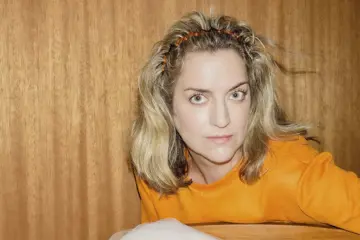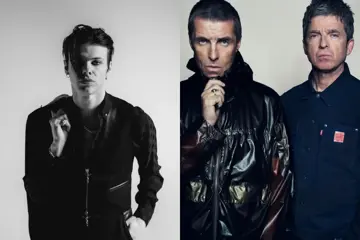When fast rising Queensland rockers The Medics scooped the pool at the National Indigenous Music Awards (NIMAs) in Darwin last month – they took home gongs for New Talent Of The Year, Album Of The Year (for debut album Foundations) and Song Of The Year (for single Griffin) – few who've been following their progress in recent times would have been surprised in the slightest. The young four-piece have been conquering everything placed before them since forming in Cairns in 2007, first moving down to the big smoke of Brisbane and then, having ticked every musical box in the state capital, turning their attention to the national stage, which has also capitulated to their atmospheric charm.
They smashed it at Splendour In The Grass, once again hammered it at BIGSOUND – unsurprisingly on either front, given that The Medics are no strangers to the big stage having already become veterans of Big Day Out, Laneway Festival, Woodford and plenty of other massive events – and their debut Foundations has been getting rave reviews, but so far it's the wins at the NIMAs and the experience they had accepting the awards at the ceremony in Darwin that has been the real highlight for the close-knit band.
“You could say that getting the awards at the NIMAs was something really special for us,” reflects frontman Kahl Wallace. “It's really interesting, because a lot of other people are working and helping the band move along now – there's a lot of other people in the mix – and it's just really great for them to see us get some of those awards and getting the great reviews. It's all new to us and we're just going with the flow really and having fun with it. We're just playing shows and just enjoying being in the band and the music industry.
“It was a really special night [at the NIMAs], and it means a lot to our family. To be in Darwin and to see the people there and to rub shoulders with people like Troy Cassar-Daley – he had some words of wisdom – and just to be up on stage with my uncle Bunna Lawrie [of iconic Indigenous rock band Coloured Stone] – that's Jhindu [Lawrie – drums/vocals]'s father – to be up there with him and to play one of his well-known songs, Black Boy, was a really special thing and I think it was really well-received. And we ended up playing [Dylan cover] Blowin' In The Wind as well, Thelma Plum actually came out and sang a verse as well – she's a singer-songwriter from Brisbane, she got the Unearthed spot for the NIMAs, she's an up-and-coming Indigenous singer-songwriter. It was a great night. It was held at the Botanical Gardens – such a beautiful setting – and just to be a part of that was amazing.”
Don't miss a beat with our FREE daily newsletter
But really their achievements at the NIMAs are merely the culmination of a journey they started a couple of years ago when, having already released two well-received EPs, they bunkered down to begin work on what would become their debut record.
“It's been a while since we first went in the studio – that was nearly two years ago I guess when we first started talking to Yanto Browning, our producer,” Wallace recalls. “We met him probably as soon as we moved down to Brisbane and got talking and then we got the [Federal government] Breakthrough grant and got to go down and record at 301 Studios at Byron Bay. It was amazing – it was our first time in a big studio like that and it was great to have him there to guide us as well, because we're still exploring sounds and being savvy with being in the studio and having a time limit to get all the music out. It was an experience and a steep learning curve.”
Anyone who's seen the seen the band's frenetic and celebratory live show will attest that The Medics have nailed this aspect of their craft, so the challenge for the young musicians was to try and capture this intensity in the studio.
“I love watching bands who have a good stage presence or dynamic – when you look at them you can really tell that they're loving what they're doing; they're not just standing there depressed and not moving around – so we try to just have an experience and just really be real. It's always different, but we always try to push the boundaries with our live performance,” Wallace enthuses. “We always wanted to really capture our live performance and have that big-sounding energy and I think we did capture it to an extent. You can always learn from it and better yourself for the next time around, but I think we did really well in capturing our sound and taming that raw energy to put it into the record.
“We set up as if we were playing live in the studio – we were in different areas but we could see each other – and we played along and got the raw bones for the songs and then went along and just layered on top of that with extra guitar parts; just filling out the sound. Just having fun really listening to it and just being amazed by the results. In the past we'd never really captured our sound how we wanted it, so this time around it was really great to hear it through the monitors in the studio to go, 'Wow, this is amazing! This is really what we want the band to be'. Our sound's always going to be changing and we're always wanting to do something different, but we're just having fun creating music really. We don't have a formula or anything like that, we just kinda jam and everyone has a say in the song – everyone in the band is a songwriter in their own right. We're all just having fun.”
The Medics have forged a distinctive sound already – despite being still in their formative stages in many respects – and while they don't feel that they're slavishly derivative, Wallace concedes that there's some bands that they look up to for their dense, atmospheric sound.
“You know there's a lot of bands whose sound has inspired us, bands like Explosions In The Sky, Sigur Ros and obviously The Mars Volta and At The Drive-In in their own way,” he ponders. “There's heaps of bands out there, just a lot of textural stuff – the Deftones and Smashing Pumpkins I guess have influenced us along the way. But we've never really listened to an album and said, 'We want to make an album that sounds like that'. I'm sure our album sounds like some other bands production-wise, but it could just be by coincidence, I can't really say.
“We never really set out to say, 'I want to be like that', it's just kind of happened over the years just slugging it out and not really being too influenced by the music around us. Just being in our own world – like still listening to music and stuff, but not coming to the rehearsal or the studio and saying, 'We need to sound like this', we just went in there and did it. But I'm sure the influences were there subconsciously in a way, like all bands.”
While their songwriting has become increasingly collaborative in recent times, the lyrical component of The Medics' songs is still Wallace's domain and he explains that Foundations is a group of individual songs without any thread or overriding theme holding them together.
“I don't really see a major theme, they're all kind of different lyrically – they're not all about the same thing, they're all different and they all have their own stories and story behind the lyrics,” he offers. “I tend to just spew out lyrics onto a piece of paper and sing them over the top of the music and just try to critique it as we go when we start writing the song in the studio or in the rehearsal space. I just try to get the emotions out onto paper – or wherever I can – and go from there really. The initial writing of the lyrics is pretty messy and just comes straight out. I try to be as real as I can be.”
And while keeping it real has so far proved no problem whatsoever for the talented four-piece, Wallace admits that deep down they have their eyes on even more distant horizons. “We went away a few months ago – we went down to Seal Rocks, north of Sydney, and started writing some new music, so we're thinking about album two,” he discloses. “It's just a matter of us writing and creating this next album... There's always those dreams of travelling the world, but we like to live in the moment and I think we'll just take it in our stride and if things happen and we get to go overseas that will be amazing.”
DEADLY AMBITION
On top of their success at the NIMAs The Medics have been nominated for Album Of The Year and Band Of The Year at the annual Deadly Awards – the annual celebration of Indigenous cultural and sporting achievement – and Wallace couldn't be prouder.
“It's going to be my first time – I missed out on going a couple of years ago, which was a shame because we were given Band Of The Year, which was pretty amazing,” he enthuses. “I'm really keen to get along; it's another special night for the Indigenous community and Indigenous music.
“It's important because it goes to show what can be done. There's a lot of people out there who might have an idea of what Indigenous music is, so when they see a band like us playing hopefully it breaks down some preconceptions – it's not just reggae or didgeridoos, it's something different as well. Indigenous music is just music – it's not different to any other music. I don't see why people have to label things. But I don't know, it just shows that there is different music out there, it's not all world music but some 'popular music' as well, if you want to put it that way.”
Their incredible success to date must surely help break down some cultural barriers as well, especially when rock fans get to see The Medics holding their own on the big stage at events like Splendour and other festivals.
“Exactly – breaking down the barriers and just bringing people together in a way and opening up people's minds to a whole new thing,” Wallace offers. “There was a lot of support for the NIMAs and I think we should get behind it more and start sharing. Things are changing in the music industry, so to see artists out there like Busby Marou and Dan Sultan, plus people like Jessica Mauboy being in big production movies, is so great. It's a bit of a change and I think we're seeing the start of a new era, it's great to see that happening and to be a small part of it.”















